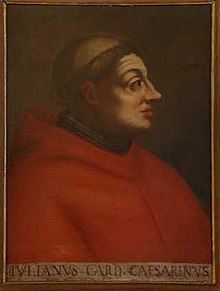Giuliano Caesarini | |
|---|---|
 Giuliano Caesarini, portrait from the University of Bologna | |
| Church | Latin Church |
| See | See of Rome |
| Orders | |
| Ordination | by Pope Martin V |
| Personal details | |
| Born | 1398 |
| Died | 10 November, 1444 Varna, Ottoman Empire |
| Denomination | Roman Catholic |
Julian Cesarini the Elder (It.: Giuliano Cesarini, seniore) (1398 in Rome – 10 November 1444 in Varna, Ottoman Empire) was one of the group of brilliant cardinals appointed by Pope Martin V upon the conclusion of the Western Schism. His intellect and diplomacy made him a powerful agent first as part of the Council of Basel and then, after he broke with the Conciliar movement at Basel, of papal superiority against the Conciliar movement. The French bishop Bossuet described Cesarini as the strongest bulwark that the Catholics could oppose to the Greeks in the Council of Florence.
One of five brothers of a well-established Roman family of the minor nobility;[1] his brother Giacomo was appointed papal Podestà of Orvieto and Foligno in 1444; his great-nephew, also Giuliano Cesarini Giuliano (1466–1510) was made a cardinal in 1493.[2] He was educated at Perugia, where he lectured on Roman law and had Domenico Capranica among his pupils. When the schism was ended by the general recognition of Martin V as pope, Giuliano returned to Rome, where he attached himself to Cardinal Branda da Castiglione.
The suggestions for wide reform that informed the Conciliar Movement were rife, and Cesarini devoted his career to the principles of the outward unity of the Church and its reformation from within.
In 1419 he accompanied Cardinal Branda da Castiglione, who thought highly of him, on his difficult mission to Germany and Bohemia, where the Hussites were in open rebellion. He also served as a papal envoy to England. In 1426 Martin V created Cesarini a cardinal[2][3] and later sent him to Germany to preach a crusade against the Hussites. After the crusade failed, Cesarini was sent to Basel to preside over the council that had begun there.
- ^ Cesarini genealogy, Sardimpex, archived from the original on May 7, 2006, retrieved January 28, 2007.
- ^ a b Miranda, Salvador. "CESARINI, seniore, Giuliano (1398-1444)". The Cardinals of the Holy Roman Church. Florida International University. OCLC 53276621. Retrieved 30 October 2021.
- ^ Cheney, David M. "Giuliano Cardinal Cesarini (Sr.)". Catholic-Hierarchy.org. Retrieved October 30, 2021.